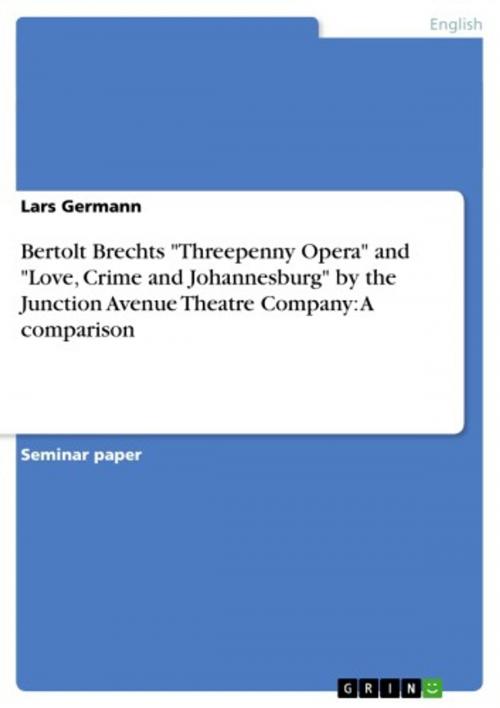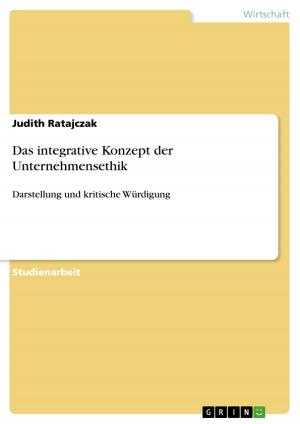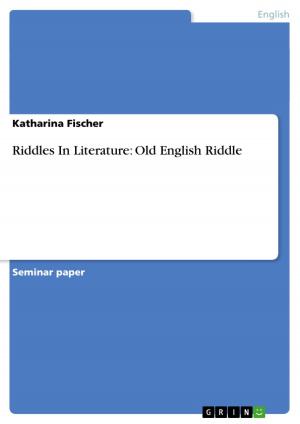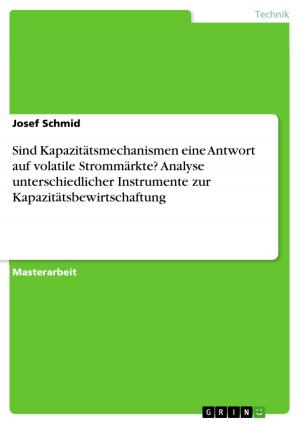Bertolt Brechts 'Threepenny Opera' and 'Love, Crime and Johannesburg' by the Junction Avenue Theatre Company: A comparison
Fiction & Literature, Literary Theory & Criticism, British| Author: | Lars Germann | ISBN: | 9783640454679 |
| Publisher: | GRIN Verlag | Publication: | October 22, 2009 |
| Imprint: | GRIN Verlag | Language: | English |
| Author: | Lars Germann |
| ISBN: | 9783640454679 |
| Publisher: | GRIN Verlag |
| Publication: | October 22, 2009 |
| Imprint: | GRIN Verlag |
| Language: | English |
Seminar paper from the year 2008 in the subject English Language and Literature Studies - Literature, grade: 1,3, RWTH Aachen University (Institut für Anglistik), course: Theatre and Change in South Africa, language: English, abstract: Telling a South African story on the blueprint of a German 1920s sociocritical plot is an ambitious endeavour. The question must be legitimate if this endeavour has been successful - and even useful: Have Brecht, his themes and techniques enriched the presentation of this particular South African situation? Have they solely served as an empty shape, an exchangeable framework for the play? After all: Would Bertolt Brecht - whose work has been misinterpreted and misused frequently in the past - agree with this adaptation? 'The theories of Bertolt Brecht have played a very influential role in much of Junction Avenue Theatre Company's work, delivering not only an attitude to content, but also a series of ideas about form and style' (LCJ, x), write Malcolm Purkey and Carol Steinberg in the introduction of 'Love, Crime and Johannesburg'. If so - can their play be seen in a Brechtian tradition? Or will it stand aside, as some 'exotic' adaptation that is hardly ever going to have a proper place in the aftermath of Brecht's oeuvre? What significance has Brecht for Black Africa, any way? And how has his work, have his ideas made an impression on African theatre makers? Have Brechtian themes ever been of any relevance for African people? These are questions that will be answered in the wake of this investigation.
Seminar paper from the year 2008 in the subject English Language and Literature Studies - Literature, grade: 1,3, RWTH Aachen University (Institut für Anglistik), course: Theatre and Change in South Africa, language: English, abstract: Telling a South African story on the blueprint of a German 1920s sociocritical plot is an ambitious endeavour. The question must be legitimate if this endeavour has been successful - and even useful: Have Brecht, his themes and techniques enriched the presentation of this particular South African situation? Have they solely served as an empty shape, an exchangeable framework for the play? After all: Would Bertolt Brecht - whose work has been misinterpreted and misused frequently in the past - agree with this adaptation? 'The theories of Bertolt Brecht have played a very influential role in much of Junction Avenue Theatre Company's work, delivering not only an attitude to content, but also a series of ideas about form and style' (LCJ, x), write Malcolm Purkey and Carol Steinberg in the introduction of 'Love, Crime and Johannesburg'. If so - can their play be seen in a Brechtian tradition? Or will it stand aside, as some 'exotic' adaptation that is hardly ever going to have a proper place in the aftermath of Brecht's oeuvre? What significance has Brecht for Black Africa, any way? And how has his work, have his ideas made an impression on African theatre makers? Have Brechtian themes ever been of any relevance for African people? These are questions that will be answered in the wake of this investigation.















